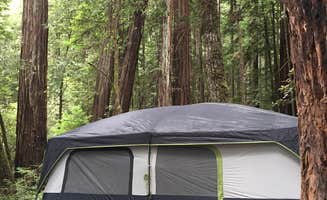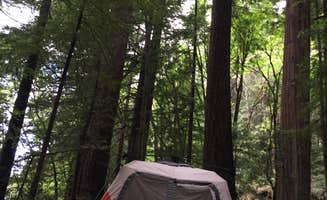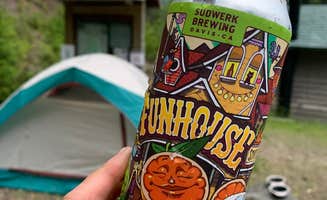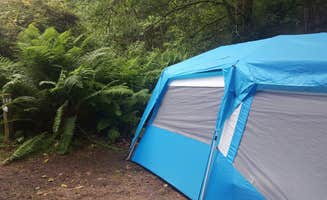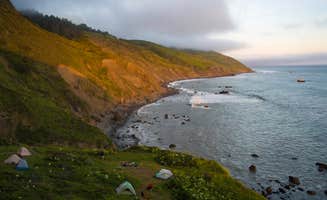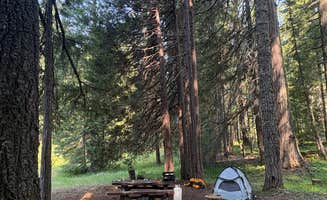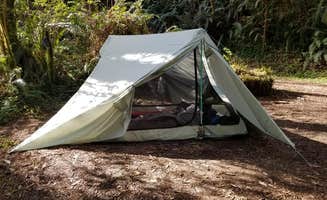Tent camping near Fortuna, California offers a mix of coastal and redwood forest experiences with seasonal considerations affecting availability. Winter rainfall in the region averages 45-55 inches annually, with most precipitation occurring between November and March. Summer fog frequently blankets coastal areas while inland sites experience warmer daytime temperatures, creating microclimates that campers should prepare for with layered clothing.
What to do
Hiking the Lost Coast Trail: King Range Conservation Area provides trailhead access to this challenging coastal route. "Black sand beaches, cliffside camping, pristine wilderness and you have it all to yourself! Gorgeous hike, a little rough due to sand and rocks but well worth the effort," notes Jessica M. The trail requires careful planning around tides and weather conditions.
Mountain biking: Lacks Creek offers dedicated biking trails with varying difficulty levels. A camper mentions, "There's a nice running/bike path right in the camp ground," though they caution about tick presence in warmer months.
River activities: Camping at riverside locations provides water recreation opportunities. At A.W. Way County Park, visitors can enjoy the Mattole River, though one camper notes the river is "usually low on water in the summer months."
What campers like
Privacy between sites: Wuss Camp features well-spaced camping areas. According to Colleen, "The sites are widely dispersed and circle around a beautiful meadow," creating a sense of seclusion despite proximity to amenities.
Clean facilities: Several campgrounds maintain high standards for bathrooms and showers. Dylan C. reports that Wuss Camp offers "great, spacious and clean space with amazing bathrooms and showers," a significant benefit for tent campers seeking comfort.
Wildlife viewing: Campers frequently report animal sightings at established campgrounds. The Mattole River area hosts diverse wildlife, with one camper at A.W. Way County Park noting the family-friendly nature of the location where "deer and skunks frequent the area."
What you should know
Access challenges: Many campgrounds require driving on unpaved roads. Jon E. reports that Lacks Creek is a "pretty far drive off a dirt road," while another camper notes it's "40 minutes from 299" with some rough sections.
Cell service limitations: Communication can be difficult or impossible at remote sites. Scout G. warns about Lacks Creek: "I had no service for miles with Verizon. Not just spotty service, literally nothing until I drove back down 15 minutes and camped on a road turnout."
Seasonal pest concerns: Ticks are common in certain locations, particularly in spring and early summer. At Lacks Creek, one camper experienced "6 ticks" in just 30 minutes, while another advises, "Be careful if you have any animals."
Tips for camping with families
Security awareness: At Williams Grove Group Camp, campers should take precautions with belongings. Susan H. shares, "We were there as a group with Cubscouts and Boy Scouts and on the 2nd night had about $500 worth of food and gear stolen while we were sleeping. Definitely lock up or put away your gear at night."
Bring sufficient water: Some remote campgrounds lack potable water. Ann N. warns that Camp Mattole requires you to "haul your own water in," making pre-trip planning essential for families with higher water needs.
Consider seasonal timing: For the best tent camping near Fortuna, California, note that many established campgrounds have limited operating seasons. Baxter Environmental Camp operates "mid-May to late September," while Williams Grove Group Camp is available only from "Memorial Day to Labor Day."
Tips from RVers
Specialized campgrounds: Cuneo Creek Horse Camp in Humboldt Redwoods State Park caters to equestrians but may disappoint other campers. Ann N. advises, "Don't bother unless you have horses," describing it as "a long drive between Garberville and Honey Dew."
Limited hookup availability: Most campgrounds near Fortuna provide minimal RV amenities. Even at established campgrounds, electrical, water, and sewer connections are rare, requiring self-containment for most RV camping in the region.
Campsite selection considerations: RVers should call ahead to confirm site dimensions and access routes. Many campgrounds have narrow, winding access roads and limited turning radius, making navigation challenging for larger vehicles.



